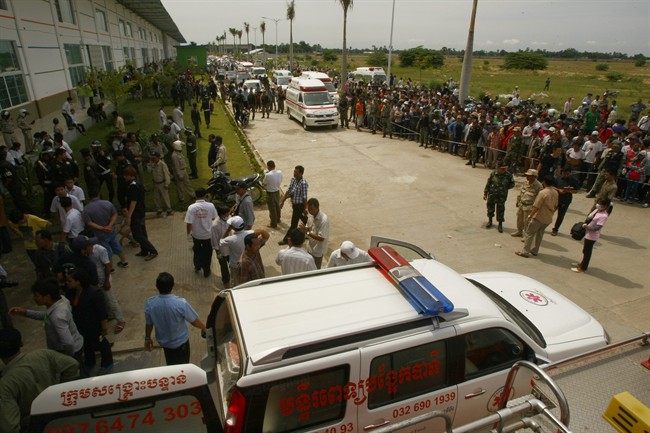PHNOM PENH, Cambodia – Garment workers pressing for higher wages joined opposition activists in protests in the Cambodian capital on Thursday, adding to pressure on Prime Minister Hun Sen.

The protests in Phnom Penh on Thursday came as the country’s garment manufacturers association recommended that its members stop operations for a week. It cited a fear that demonstrators might damage the factories if workers didn’t come out on strike. The country is home to about 500 factories producing clothes and shoes for foreign brands.
Several thousand people were gathering for a rally in the city, according to witnesses.

Get daily National news
Hun Sen won elections in July that extended his 28-year rule in the poor Southeast Asia nation, but protesters led by the head of the opposition, Sam Rainsy, accuse him of rigging the vote. They have been staging street protests and demanding that he resign and call new elections.
READ MORE: Bangladesh factory collapse prompts reform, but long-term impact uncertain
Prolonged labour unrest in the economically vital garment sector will hurt the government. The industry employs more than 500,000 people and is the biggest export earner. The workers are demanding a monthly salary of $160, up from their current minimum of $80. Many of them have been striking for several months.
“The government and the factory owners know that workers cannot survive with the current salary, but why can’t they agree to increase the wages?” said Chea Mony, president of the Free Trade Union of Workers.
Low wages are the major incentive for international clothing manufactures to set up factories in Cambodia. As elsewhere in the region, unions are pressing for higher compensation and better working conditions, an issue that has been in the spotlight following recent deadly disasters in Bangladeshi factories.
READ MORE: 6 months later – What has changed since the Rana Plaza factory disaster?
- Teen who desperately needed size 23 shoes now holds 2 world records
- Canada abstains from UN motion calling on Israel to end presence of Gaza, West Bank
- U.S. sues owner of ship that caused Baltimore bridge collapse for US$100M
- Iranian hackers tried to send stolen Trump info to Biden campaign, FBI says








Comments